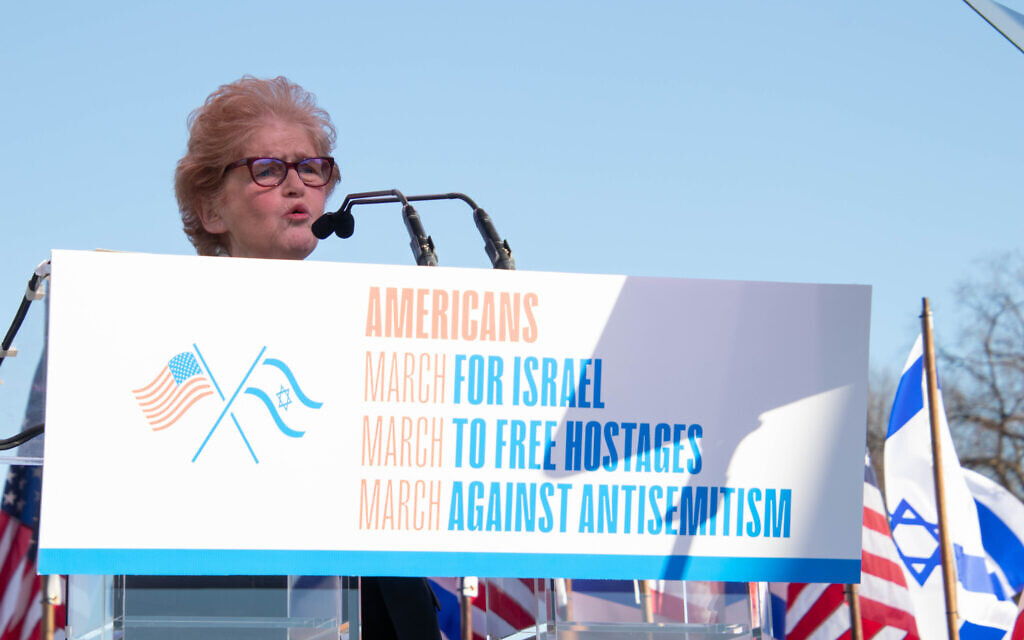



WASHINGTON — Between passionate speeches from college students and tight security flanking all sides of the protest, anxieties surrounding rising antisemitism loomed large over the historic 290,000-person crowd that attended the March for Israel rally in DC yesterday.
On top of showing support for Israel and demanding the safe return of the 240 hostages kidnapped by Hamas, rally organizers put combating antisemitism at the top of their agenda, featuring speakers ranging from US government officials to campus activists.
In her speech, US antisemitism envoy Deborah Lipstadt guaranteed the Biden administration’s support for American Jewry, citing a tidbit from America’s founding when George Washington assured the Jewish community of Newport, Rhode Island, that the “new nation would give bigotry no sanction, and persecution no assistance.”
“This government stands shoulder-to-shoulder against Jew-hatred. We stand arm-in-arm to combat antisemitism, wherever it hides or attempts to reside,” she said to a cheering crowd.
A major portion of the hundreds of thousands of demonstrators yesterday were Jewish teens and college students attending the rally with their day schools, youth groups and university Hillel chapters.
Though long a flashpoint for the Israeli-Palestinian conflict in the US, American college campuses have become especially combustive since October 7.
“This past Shabbat on campus, people cursed us out as we were walking,” said University of Maryland student Elan Moskowitz, who arrived early to the rally. “And on the Shabbat before, there were some people who yelled ‘Hamas’ as they passed us by.”
A few days before the protest took place, the Anti-Defamation League released data on antisemitic incidents in the US since October 7, reporting a 316% increase from last year during the same time frame.
ADL director Jonathan Greenblatt told The Times of Israel that the watchdog has tracked 124 incidents of antisemitism on college campuses this month after October 7, versus 12 in that same time period a year ago.
Greenblatt said there is no doubt that the antisemitism surge his organization is documenting has “been accelerated by anti-Zionists,” who he alleged are trying to use this moment to blame Israel for what happened on October 7.
“We’ve got our work cut out for us, to make sure our colleges and universities are truly safe spaces for our Jewish kids,” Greenblatt told The Times of Israel while attending the rally. “Things have unraveled at these universities and it’s time to take them back.”
George Washington University student Sabrina Soffer spoke onstage about her campus experience since October 7, recalling how a student tore down Israeli hostage posters from inside the campus Hillel building.
“We fight antisemitism with strong and informed ‘semitism,’ with vibrancy,” she said to the crowd, which had thinned out in the protest’s final stretch.
Although most attendees were American Jews, there was no dearth of Christian Zionists who showed up at the Mall to declare their support for Israel.
Mark Moore, a pastor from Chicago, said that it’s important to him “that Jewish people know Christians stand with them because the Jewish people stand for life, they stand for democracy, they stand for freedom.”
Moore noted that he also has his “biblical beliefs,” but that he would stand against antisemitism “even if I put the Bible away, stopped believing in it.”
“So many Jewish people here today have sincerely come up and thanked us when they saw our signs. It struck me that they looked relieved — I feel they’ve been uncertain, and scared, and they shouldn’t have to feel that way,” Moore said.
Despite the rally’s strong stance against antisemitism, a handful of progressive Jewish groups were angered by the inclusion of controversial pastor John Hagee in the speaker lineup. A staunch supporter of Israel, Hagee has nevertheless made statements in the past which both conservatives and liberals label as antisemitic.
“Contrary to what I was told, Pastor John Hagee will be speaking at today’s rally. I am horrified that he was given this platform. His history of hateful comments should disqualify him from decent company, much less from speaking on stage,” said Americans for Peace Now president Hadar Susskind, whose organization participated in the rally.
The rally, enclosed on all sides with fencing, faced very little opposition from counter-protesters save for Neturei Karta, an outspokenly anti-Zionist Haredi sect that set up on the sidewalk adjacent to the event entrance.

Security guards at the event entrances required attendees to go through a metal detector and have their bags checked before entering the National Mall. The Homeland Security Department dedicated substantial personnel ahead of the rally, according to what law enforcement officials told The Associated Press.
Brandeis University student Meshulam Ungar felt that the “incumbent antisemitism” he has seen crop up on college campuses over the past month and a half has mobilized young American Jewry, and that this rally is an expression of that.
“I believe that young Jews, their sense of the world and sense of identity, is being shaped by what’s happened over the past month and a half,” he said, comparing the process to that of American Jewry during the Six Day War or Yom Kippur War.
“People [then] felt like Israel was existentially threatened. Whether or not Israel was existentially threatened on October 7th is a moot point, because it shattered our sense of safety and security,” he said.



